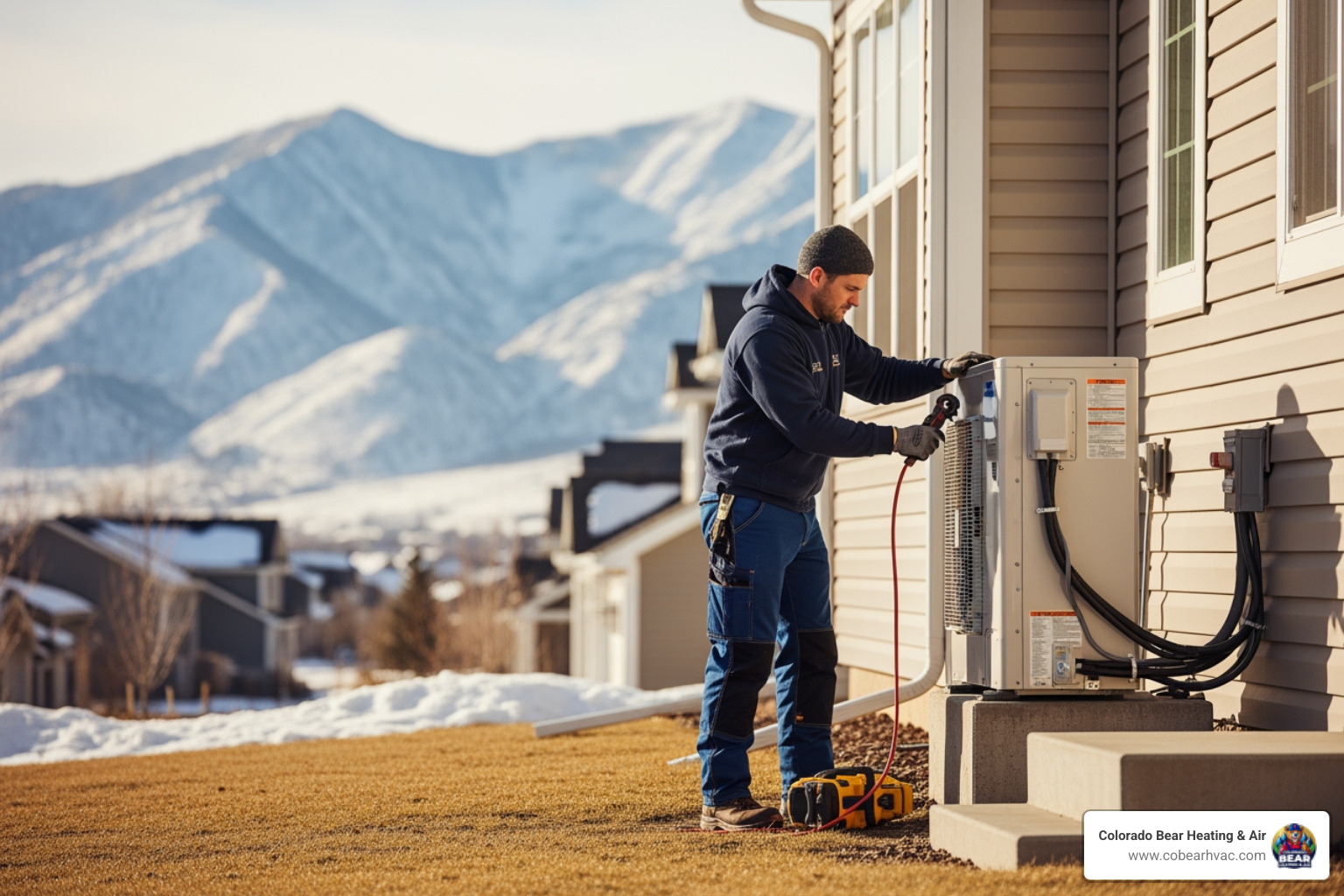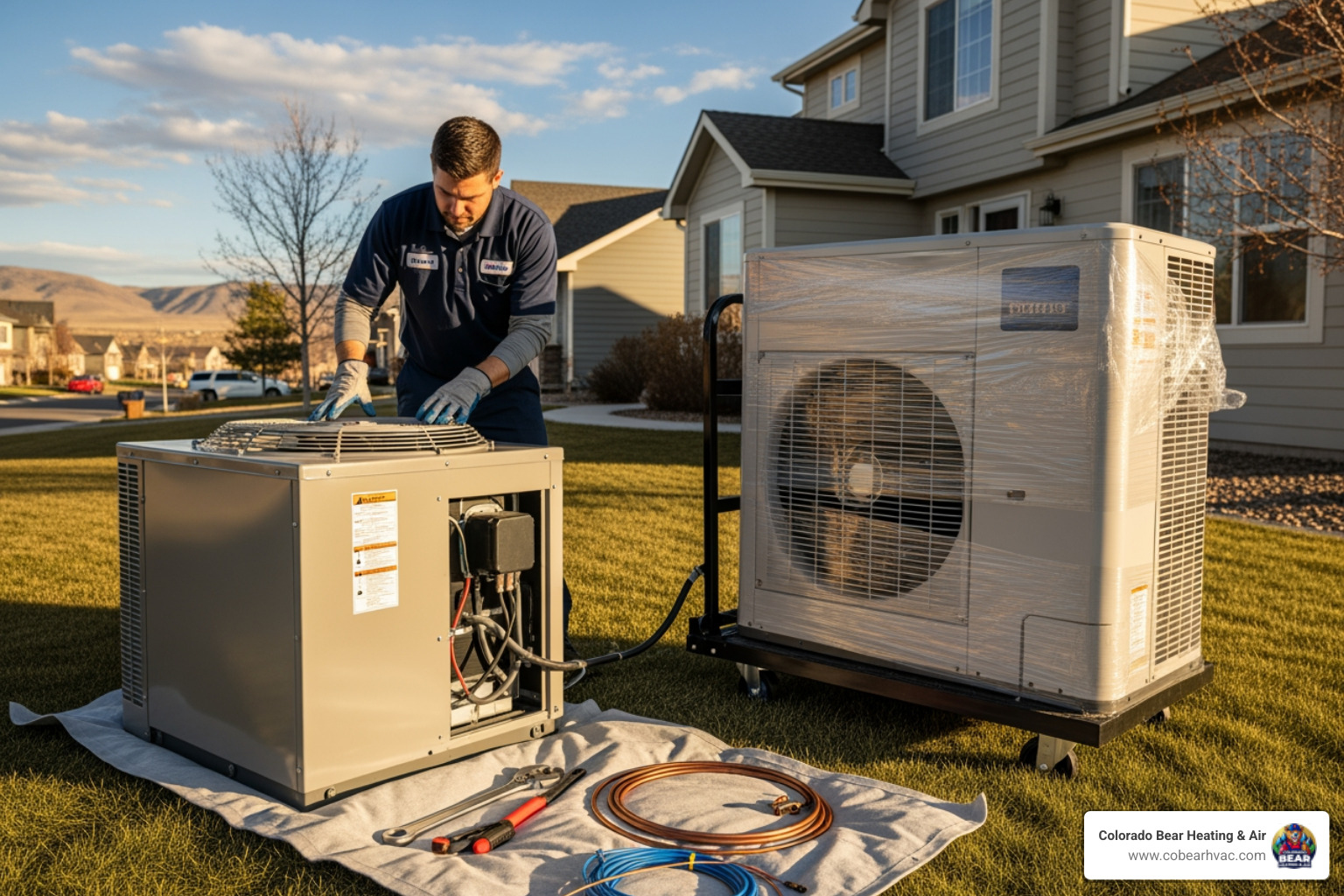


The Ultimate Guide to Furnace Installation in Centennial, CO
This guide will walk you through everything you need to know about furnace installation in Centennial, CO, from identifying the need for replacement to understanding costs and choosing the right local professional.
Do You Need a New Furnace? Signs It's Time for Replacement
How do you know if a repair will suffice or if it's time for a full furnace replacement? Look out for these common indicators:
- Age: Most furnaces last 15-20 years. If yours is approaching or exceeding this lifespan, replacement is often more cost-effective than continuing repairs.
- Rising Energy Bills: An older furnace loses efficiency, working harder and consuming more energy to produce the same heat, leading to higher utility costs.
- Strange Noises or Safety Concerns: Loud banging, rattling, or humming can signal serious mechanical problems. Yellow burner flames or signs of soot could indicate incomplete combustion, posing a carbon monoxide risk.
Understanding Furnace Types: What's Best for Centennial Homes?
Choosing the right furnace involves considering fuel type, efficiency, and how it operates:
- Gas Furnaces: The most common choice in Colorado due to natural gas availability and generally lower operating costs. They provide powerful heating suitable for our cold climate.
- Efficiency Levels (AFUE): Annual Fuel Utilization Efficiency measures how much fuel is converted to heat. Standard furnaces have around 80% AFUE (meaning 20% of fuel is wasted). High-efficiency models boast 90-98%+ AFUE, saving energy and money long-term, though their upfront cost is higher. Given Centennial's heating demands, a high-efficiency unit is often a worthwhile investment.
- Single-Stage: Always runs at full capacity. Least expensive but can lead to temperature swings.
- Age: Most furnaces last 15-20 years. If yours is approaching or exceeding this lifespan, replacement is often more cost-effective than continuing repairs.
- Frequent & Costly Repairs: Are repair bills piling up? Investing in a new, reliable system might be wiser than patching an old, failing unit.
- Rising Energy Bills: An older furnace loses efficiency, working harder and consuming more energy to produce the same heat, leading to higher utility costs.
- Uneven Heating: Cold spots or rooms that never seem warm enough can indicate an aging or improperly sized furnace struggling to distribute heat effectively.
- Strange Noises or Safety Concerns: Loud banging, rattling, or humming can signal serious mechanical problems. Yellow burner flames or signs of soot could indicate incomplete combustion, posing a carbon monoxide risk.
Based on data from local providers and cost estimators like UniColorado and Tipping Hat Plumbing, Heating & Electric, homeowners in the Centennial and Denver metro area can generally expect furnace installation costs to range from approximately $5,000 to $13,500 or more.
Factors Influencing Your Final Cost:
- Furnace Unit: The primary driver. High-efficiency models, variable-speed units, and top-tier brands cost more than basic, single-stage, 80% AFUE units.
- Labor Costs: Reflects the technician's time, expertise, and the complexity of the job.
- Permits: Necessary for safety and code compliance, adding a small fee.
Always get detailed, written estimates from multiple licensed contractors. Be wary of quotes that seem drastically lower than average, as they may cut corners on quality or safety.
How to Choose the Right Furnace Installation Contractor in Centennial
Selecting the right HVAC company is crucial for a safe, efficient, and lasting installation. HereÂs what to look for:
- Local Expertise & Licensing: Choose a company familiar with Centennial's climate, housing stock, and local codes. Verify they are licensed and insured in Colorado. Colorado Bear Heating & Air is fully licensed and insured, serving the Denver Metro Area, including Centennial.
- Positive Reviews: Check online reviews on Google, BBB, and other platforms. Look for consistent feedback regarding professionalism, quality of work, and customer service.
- Gas Furnaces: The most common choice in Colorado due to natural gas availability and generally lower operating costs. They provide powerful heating suitable for our cold climate.
- Electric Furnaces: While installation costs might be lower, operating costs are typically higher in Colorado unless paired with a solar energy system. They can be a viable option where gas lines aren't available.
- Efficiency Levels (AFUE): Annual Fuel Utilization Efficiency measures how much fuel is converted to heat. Standard furnaces have around 80% AFUE (meaning 20% of fuel is wasted). High-efficiency models boast 90-98%+ AFUE, saving energy and money long-term, though their upfront cost is higher. Given Centennial's heating demands, a high-efficiency unit is often a worthwhile investment.
- Stages (Single, Two-Stage, Variable-Speed):
- Single-Stage: Always runs at full capacity. Least expensive but can lead to temperature swings.
- Two-Stage: Runs at a lower capacity most of the time, only kicking into high gear when needed. Provides more even heat and better efficiency.
- Variable-Speed: Adjusts heating output precisely, offering the most consistent comfort, quietest operation, and highest efficiency.
1. Consultation & Assessment: A technician visits your home, discusses your needs, assesses your existing system and ductwork, and performs a load calculation to determine the right furnace size and type.
2. Quote & Agreement: You receive a detailed written quote. Once you agree, the work is scheduled.
3. Preparation: The work area is protected, and the old furnace is carefully disconnected and removed.
4. Installation: The new furnace is set in place, connected to ductwork, fuel lines, electrical systems, and venting (including new PVC venting if installing a high-efficiency unit). The thermostat is often replaced or upgraded.
5. Testing & Commissioning: The technician starts the new furnace, checks for proper operation, tests safety controls, and ensures optimal airflow and temperature output.
6. Cleanup & Walkthrough: The work area is cleaned, and the technician explains the new system's operation, maintenance requirements, and warranty details.
Saving Money: Rebates and Financing for Centennial Residents
Investing in a new furnace, especially a high-efficiency model, can qualify you for savings:
- Xcel Energy Rebates: Often offers rebates for installing high-efficiency natural gas furnaces. Check the Xcel Energy website for current offers and eligibility requirements.
- Contractor Financing: Many reputable HVAC companies, including Colorado Bear Heating & Air, offer flexible financing options to help spread out the cost of your investment.
What About Emergency Furnace Installation?
Furnaces often fail at the worst possible times  usually during the coldest days. If your furnace dies unexpectedly, many local companies, including Colorado Bear Heating & Air, offer emergency furnace installation services in Centennial to restore your heat quickly and safely.
Maintaining Your New Furnace
Protect your investment and ensure peak performance with simple maintenance:
- Change Filters Regularly: Follow manufacturer recommendations (typically every 1-3 months) for filter changes to maintain airflow and efficiency.
Need Professional Furnace Installation in Centennial?
Choosing and installing a new furnace is a significant decision. By understanding the process, costs, and how to select a qualified local contractor, you can ensure your Centennial home stays warm and comfortable for years to come.
At Colorado Bear Heating & Air, we bring over 20 years of experience, honesty, and a customer-first approach to every job. We are proud to serve Centennial and the surrounding Denver Metro communities.
Ready for a reliable, efficient heating solution? Contact Colorado Bear Heating & Air today for a free, no-obligation estimate on your furnace installation project.
Frequently Asked Questions (FAQs)
Q: How much does furnace installation typically cost in Centennial, CO?
A: Costs vary significantly based on furnace type, efficiency, home size, and installation complexity. Reported ranges in the Centennial/Denver area are generally between $5,000 and $13,500+, but a detailed quote requires an in-home assessment. Factors like high-efficiency units, ductwork modifications, and complex installations increase the price.
Q: Is it worth replacing a 20-year-old furnace?
A: Generally, yes. Furnaces older than 15-20 years are significantly less efficient than modern units and are prone to breakdowns. Replacing an old furnace often leads to lower energy bills, improved reliability, enhanced comfort, and increased home safety.
Q: What AFUE rating should I look for in Centennial?
A: While 80% AFUE is the minimum standard, investing in a high-efficiency furnace (90% AFUE or higher) is highly recommended for Centennial's cold climate. The long-term energy savings often outweigh the higher initial cost. Plus, high-efficiency units may qualify for rebates.
Q: How long does furnace installation take?
A: A typical furnace replacement can usually be completed within one day (4-10 hours), depending on the complexity of the job.
Q: Do I need a permit for furnace installation in Centennial?
A: Yes, permits are typically required for furnace replacement in Centennial and surrounding areas. A reputable contractor like Colorado Bear Heating & Air will handle the permitting process for you.
Conclusion
Contact Cobearhvac to improve your indoor air quality today.
Latest blogs

Apply now for flexible payment options
Get a decision in seconds with no impact to your credit score.



Testimonials
Service Areas
If you’re in Colorado Springs, The Mountains, or nearby areas, call us to confirm availability for installations.
.avif)















.avif)
.avif)
.avif)




